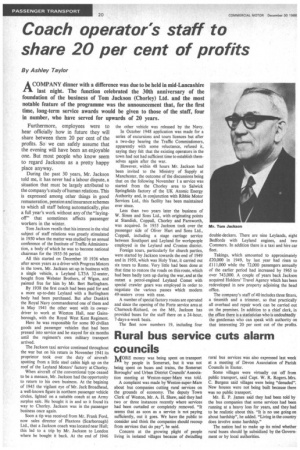Coach operators staff to share 20 per cent of profits
Page 22

If you've noticed an error in this article please click here to report it so we can fix it.
By Ashley Taylor
ACOMPANY dinner with a difference was due to be held in mid-Lancashire last night. The function celebrated the 30th anniversary of the foundation of the business of Tom Jackson (Charley) Ltd. and the most notable feature of the programme was the announcement that, for the first time, long-term service awards would be given to those of the staff, four in number, who have served for upwards of 20 years.
Furthermore, employees were to hear officially how in future they will share between them 20 per cent of the profits. So we can safely assume that the evening will have been an enjoyable one. But most people who know seem to regard Jacksons as a pretty happy place anyway.
During the past 30 years, Mr. Jackson told me, it has never had a labour dispute, a situation that must be largely attributed to the company's study of human relations. This is expressed among other things in good remuneration, pension and insurance schemes to which all staff belong automatically, plus a full year's work without any of the "layingoff" that sometimes affects passenger workers in the winter.
Tom Jackson recalls that his interest in the vital subject of staff relations was greatly stimulated in 1950 when the matter was studied by an annual conference of the Institute of Traffic Administration, a body of which he was to become national chairman for the 1955-56 period.
All this started on December 10 1936 when after seven years as a driver with Progress Motors in the town, Mr. Jackson set-up in business with a single vehicle, a Leyland LT5A 32-seater, bought from Webster Brothers, of Wigan, and painted free for him by Mr. Bert Burlingham.
By 1938 the first coach had been paid for and a more up-to-date Leyland with a Burlingham body had been purchased. But after Dunkirk the Royal Navy commandeered one of them and in May 1941 the other went with its ownerdriver to work at Wiceton Hall, near Gainsborough, with the Royal West Kent Regiment.
Here he was responsible for some 80 civilian goods and passenger vehicles that had been pressed into service and he stayed for six months until the regiment's own military transport arrived.
The Jackson taxi service continued throughout the war but on his return in November 1941 its proprietor took over the duty of aircraftspotting from a little steel cabin high up on the roof of the Leyland Motors' factory at Chorley.
When aircraft of the conventional type ceased to be a menace, Mr. Jackson had the opportunity to return to his own business. At the begining of 1945 the vigilant eye of Mr. Jack Broadhead, a well-known figure in northern passenger vehicle circles, lighted on a suitable coach at an Army surplus sale. He bought it in and so it found its way to Chorley. Jackson was in the passenger business once again.
Soon a tip was received from Mr. Frank Ford, now sales director of Plaxtons (Scarborough) Ltd., that a Jackson coach was located near Hull; this led to a trip by Mr. Jackson to London where he bought it back. At the end of 1946 the other vehicle was released by the Navy.
In October 1948 application was made for a series of excursions and tours licences but after a two-day hearing the Traffic Commissioners, apparently with some reluctance, refused it, saying they felt that the existing operators in the town had not had sufficient time to establish themselves again after the war.
However, within 48 hours Mr. Jackson had been invited to the Ministry of Supply at Manchester, the outcome of the discussions being that on the following November 1 a service was started from the Chorley area to Salwick Springfields factory of the UK Atomic Energy Authority and, in conjunction with Ribble Motor Services Ltd., this facility has been maintained ever since.
Less than two years later the business of W. Simm and Sons Ltd., with originating points at Standish, Coppull, Chorley and Farnworth, was acquired. In 1955 Jackson took over the passenger side of Oliver Hart and Sons Ltd., Coppull, including a stage carriage service between Southport and Leyland for workpeople employed in the Leyland and Croston district.
Foreign tours, particularly for church parties, were started by Jackson towards the end of 1949 and in 1950, which was Holy Year, it carried out six tours to Rome. Very little had been done at that time to restore the roads on this route, which had been badly torn up during the war, and at the outset a petrol-engined Leyland Comet with special crawler gears was employed in order to negotiate the various passes which modern 49-seaters cross with ease.
A number of special factory routes are operated and since the opening of the Forte service area at Charnock-Richard, on the M6, Jackson has provided buses for the staff there on a 24-hour, 7-days-a-week basis.
The fleet now numbers 19, including four double-deckers. There are nine Leylands, eight Bedfords with Leyland engines, and two Commers. In addition there is a taxi and hire car fleet.
Takings, which amounted to approximately £20,000 in 1949, by last year had risen to £111,000 while the 72,000 passengers annually of the earlier period had increased by 1965 to over 743,000. A couple of years back Jackson acquired Hoidens' Travel Agency which has been redeveloped in new property adjoining the head office.
The company's staff of 40 includes three fitters, a tinsmith and a trimmer, so that practically all overhaul and repair work can be carried out on the premises. In addition to a chief clerk, in the office there is a statistician who is undoubtedly the gentleman who can speak with authority on that interesting 20 per cent cut of the profits.




















































































